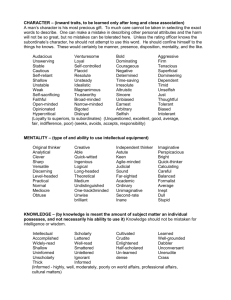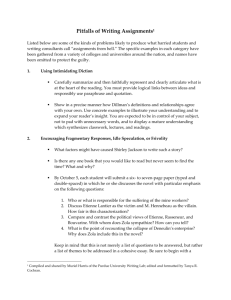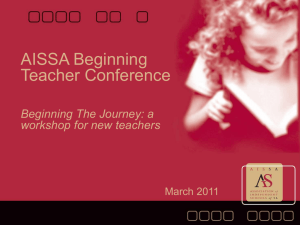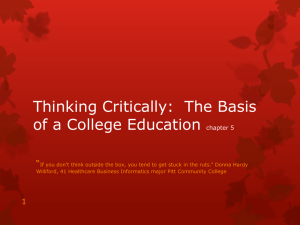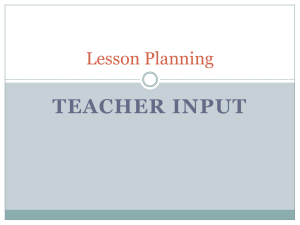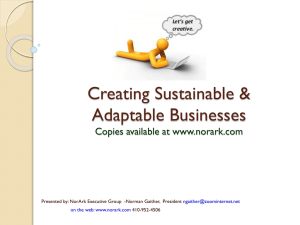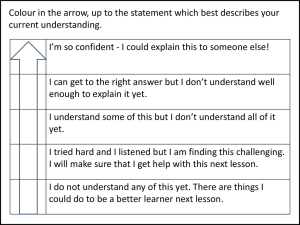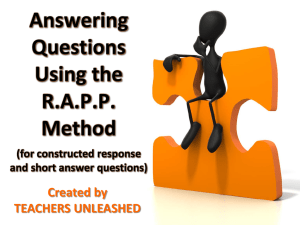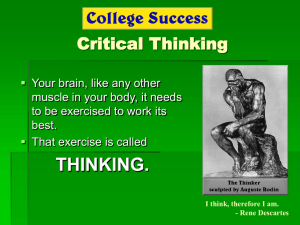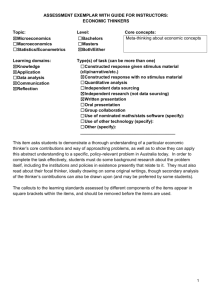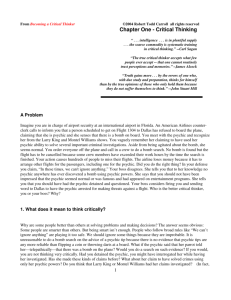Critical Thinking
advertisement
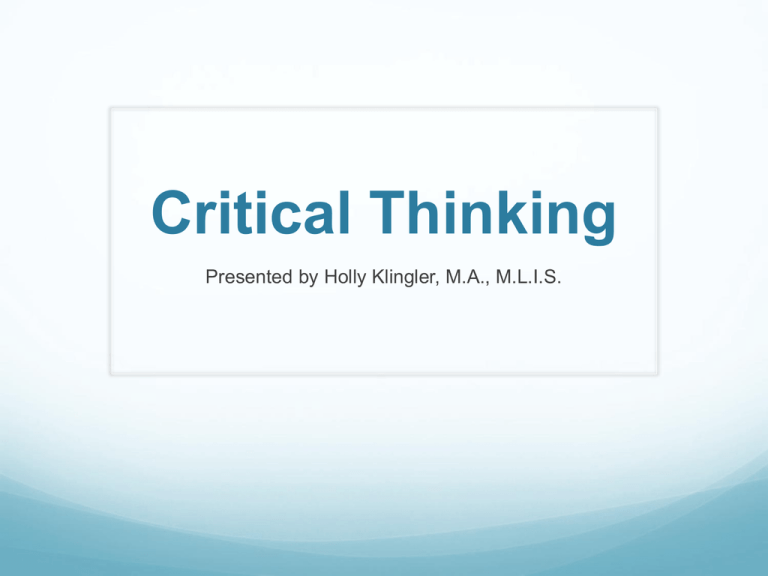
Critical Thinking Presented by Holly Klingler, M.A., M.L.I.S. When you hear “critical thinking” or “a good critical thinker,” what comes to mind? We often think of many tools that use critical thinking: Problem Solver Skilled Discussant Good Communicator Good Decision Creative Open-minded Organized Maker Ethical Adaptable Knowledgeable Passionate Good Collaborator Good Analyzer Mentally Active Remain Curious Insightful Self-Aware Critical Thinking: The act of reassessing or challenging your thinking process/ abilities so that you can think accurately and efficiently. Critical Thinking: Take a moment to reflect on your thinking process as a manager. What problems do you feel exist in your thinking process, or you wish to improve on? Critical Thinking: Take a moment to reflect on your thinking process. What areas of your thinking do you feel you are strong in? How have these skills helped you? Good News Is: Everyone has been, is and can be a good critical thinker! Our goal is to discover WHAT skills create a lifelong and conscious critical thinker. Critical Thinking: The act of reassessing or challenging your thinking process/ abilities (tools) so that you can think…. accurately AND efficiently. Must keep in mind two perspectives: The human mind is AMAZING BUT The human mind is NOT perfect Capable of multitasking Limited to some degree Able to process info Make mistakes if not quickly and intuitively Able to adapt when needed careful Influenced BY outside sources too 10+1= ? What is the answer? A bat and ball cost $1.10 The bat costs one dollar more than the ball. How much does the ball cost? What is the answer? First answer: 11 Second answer: five cents More than 50% of students at Harvard, MIT and Princeton got the bat-and-ball puzzle incorrect. More than 80% of other universities had the incorrect answer as well. * Must be “one dollar more” $1.05 + $.05 = $1.10 *Thinking Fast and Slow by Daniel Kahneman, 2011 Two of the biggest barriers to critical thinking: 1. Not keeping in mind that we can be wrong or make mistakes! Two of the biggest barriers to critical thinking: 1. Not keeping in mind that we can be wrong or make mistakes! 2. Assuming that mistakes and being wrong is simply a bad thing! Considering Critical Thinking: • What specific benefits can this balance in thinking and action have for you in your management position? • How will it help you do your job better? Or what issues/problems can it help you avoid? Considering Critical Thinking: What specific goals can you set in order to achieve that balance in thinking and action for you and your employees? Improve Accuracy Improve Efficiency • Clear expectations • Clear deadlines • Classes or training • Meetings/check-ins • Meetings/conferences/ment ors • Set limits on time/resources • Allow time to learn/take risks • Provide organizational tools or methods We can vastly improve our critical thinking (skills) if we remember: • The balance between being accurate and efficient. • The mind is amazing but not 100% perfect to avoid overconfidence. • To continually reassess and challenge our thinking process in each situation. Tools/Skills of Critical Thinking: Problem Solver Skilled Discussant Good Communicator Good Decision Creative Open-minded Organized Maker Ethical Adaptable Knowledgeable Passionate Good Collaborator Good Analyzer Mentally Active Remain Curious Insightful Self-Aware Three main skills to focus on: (Self) Aware Open-minded Adaptable = Be (Self) Aware • • • • • • Biases Experiences Values Perspective Emotions Health… All influence your thinking! Be Open-Minded • Active attention • See alternatives • Seek connections • Appreciate ambiguity • And… Allow yourself to be wrong. Be Adaptable • Learn from mistakes AND victories because things will ALWAYS change. • Adapt is ACTION. Change your environment or your environment will change you. Critical Thinking is a Lifelong PROCESS Not easy and takes constant diligence and hard work. Methods to Improve Critical Thinking: • Actively listen/look • Ask questions • Follow evidence • Be curious and relate • Be flexible and creative Methods to Improve Critical Thinking: • Assume the positive • Be responsive • See a lesson in everything • Work together • Laugh and ENJOY change! Considering Critical Thinking: • What is one skill or action that you will immediately implement today to become a better and more aware critical thinker? Considering Critical Thinking: • What is one skill or action that you will immediately implement today to become a better and more aware critical thinker? • What is one method or approach that you will take today to improve critical thinking skills in your employees? Critical Thinking Questions: • What is the purpose of my thinking (goal/objective)? • What precise question (problem) am I trying to answer? • Within what point of view (perspective) am I thinking? • What concepts or ideas are central to my thinking? • What am I taking for granted, what assumptions am I making? Critical Thinking: What Every Person Needs to Survive in a Rapidly Changing World. Critical Thinking Questions: • What information am I using (data, facts, observation)? • How am I interpreting that information? • What conclusions am I coming to? • If I accept the conclusions, what are the implications? • What would the consequences be if I put my thoughts into action? Critical Thinking: What Every Person Needs to Survive in a Rapidly Changing World. Thank you for learning about Critical Thinking! Please feel free to ask any questions or comment.
